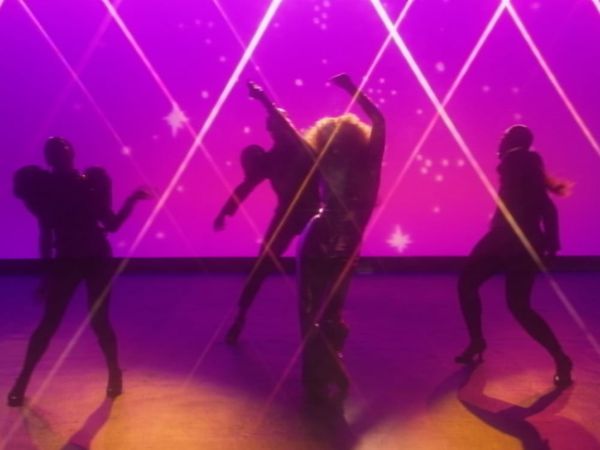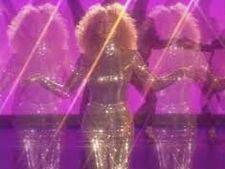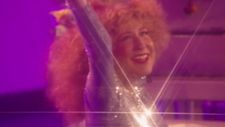 |
| Give Me Pity! Photo: Courtesy of Fantasia International Film Festival |
After making a splash at Fantasia and Edinburgh, Amanda Kramer’s Give Me Pity! is now set to screen at Fantastic Fest. At all three festivals, it has stood out, a bold piece of work not easily forgotten or confused with anything else. Shot against a simmering hot pink backdrop, full of sequins, spangles and flashing lights, it follows performer Sissy St. Sinclair (Sophie von Haselberg) as she enjoys her first TV special but gradually begins to crack under the pressure, spiralling into a psychedelic nightmare. At the former two festivals it screened alongside another film of Amanda’s, musical exploration of gender and sexuality Please Baby Please, so when we got together to chat, I asked her how she felt about them touring as a pair.
“I'm so grateful that both films can be recognised and have a twin moment,” she says, “even though they're very different, and, of course, come from different inspirations, were different teams, not shot at the same time and not meant to be released at the same time either. But suddenly they're both here. They’re separate thematic conversations but it's nice to ping pong between them. It’s such artistic fortune to be able to make larger work and smaller work within a year, to express more intimate storytelling and then attempt something vast and sprawling.”
 |
| There's no business like show business |
They’re both very striking pieces of work, and I note that, to me, her willingness to experiment makes her films more interesting to watch than many bigger budget, more polished works. Does she begin by trying to do something different?
“Yes. I don't think it's useful for any artist to live for posterity. You have to live in your time and hope that people connect to your work in your moment. But personally, I think a lot about relics, and art relics. And I think about the future of cinema and people discovering older work. Who knows how it will eventually be approached? I wonder about that future audience. Maybe somebody finds one of my films 20 years after it's released and has a deep and evocative relationship with it, like I might find an oddity of European cinema from 1968 that I become obsessed with and have no idea of the context of the time it came out, or the filmmaker – maybe they evaporated.
“I wouldn't call myself an experimental filmmaker by genre, but I do consider myself someone experimenting constantly. It's so important. If I say I'd like to play with a movie musical I mean the first thing that comes to mind is how can I experiment with that form? And if I say I want to do a psychological thriller, it's the same. How can I go diagonal within the genre? Because I don't think I could do any one genre exactly...right.” She laughs. “I would have to make it mashed potatoes, you know? Make it a mess of my own. It’s the experimental process. The writing is still about people, common themes, human concepts. But I need to twist the metal and create a new shape.”
At the same time, Give Me Pity seems quite topical in its exploration of celebrity-obsessed culture, I suggest.
“I'm a fairly tapped-in person culturally, but I can also be very out of it, to a laughable degree. I think sometimes when you're examining culture, like, let's say TikTok celebrity, YouTube celebrity, something very now, it’s possible to have a few fairly intelligible and thought-provoking things to say, but we're living inside of it. We don't have history, we don't have hindsight. I spend more time thinking about cultural phenomena from different eras. Obviously, if Sissy was contemporary, she would be a TikTok star, she would be trying to have as many followers, as many likes, as many strangers that she could consider friends and fans as possible.
“It’s all in a lineage, right? It's all about being starved for the attention of people that you have no fleshly access to, a desperation for connection that you don't get face-to-face. And so you need and need and need endlessly for people to commune with you, to feel known out in the universe, which you could never be because you're providing all kinds of façades and layers of self. And I'm very intrigued by that.
 |
| Feeling like a star |
“I'm fascinated by that need. It's not something I personally feel or have ever felt. And when I sense it in some celebrities of any stature, A list to Z list, it's powerful. It's a very powerful energy that they're emitting. Hard not to think to myself, ‘This feels like a cry for help.’ Which might be rude to say, I don't know. I don't think that about everyone, I just – you can feel when people are reaching out through a screen or a void toward love and acceptance, whether that's a television screen, a movie screen or an iPhone. There’s such aching.”
It’s fascinating but also sometimes quite uncomfortable to watch, I venture. Sissy gives us a lot of herself so it feels very personal, but there are also clearly artificial layers to her as a character.
“I have an obsession with live television,” she says. “Whether it's live in the moment – something like the Oscars might be – or just a live studio audience where you can redo a joke or failed line, like a sitcom. I have a serious attraction to that Vaudevillian sense of performing for an audience in real time, you're looking for the laugh. You're craving the applause. You want to know that you're loved, and you're feeding off of that. So when I wrote Sissy’s monologues, I’d imagine, ‘Oh, she wants a laugh here, she wants the sympathy sound or the gasp surprise sound.’ Really, she's a ham for it.
“She's constantly in performance mode. When she feels the audience slipping away, she needs to draw them back in. This creates an awkwardness, a neurosis, her anxiety amplifies. And then the laughter almost entirely subsides because the audience is abandoning her. It’s a balancing act of when she receives love and when she doesn’t, and how desperate she is for love and how forthright she'll be about that. What does it feel like when the applause disappears and it seems as though she's completely alone, where maybe you imagine a million faces or just 200 faces staring at her, shocked? Or they've simply gotten up and walked away.”
I mention that I’ve done a little bit of presenting, years ago, so I know that the pressure in that situation is enormous, having to be able to talk continually and fluently without ever getting a moment to relax and think.
“It's an immense pressure,” she agrees. “There was an era where for famous people there was such a high expectation that they could dance and be funny, sing and storytell. They had to be the full entertainer. With someone like Frank Sinatra, you have it all, right? He’s a gorgeous singer and beyond charming and he's delving into dramas, and he's winning awards. It’s so much to ask. So much, in fact, that it’s a bygone concept, it’s not necessary anymore. But it’s still left a resonance, that same drive and desire to win at more.
 |
| Grace under pressure |
“You're Lady Gaga, and you have all your Grammys, and you're touring, you’re dominating, but you still need to be in a movie, and that movie needs to win an Oscar and you need to win an Oscar too. It's just upping the ante, always. And so I think for Sissy, in that moment, it's like ‘I need to succeed and come across as somebody that is so entertaining and touches everybody and makes them laugh and cry,’ and she's just cracking. It's too much, you know?”
A lot of the magic is in the positioning of the camera, which starts out where we would expect it to be for such a show but then gradually begins to move in, intrusively close, and rest at uncanny angles.
“I was really fortunate that my cinematographer Patrick scored three cameras,” she says. “He and the camera operators began shooting a regular TV special. He made sure that it felt like the dance numbers were covered and a close-up on her face had a filter so she looked divine. Everything you would expect in an old Cher or Streisand show. And then as the plot is twisting, and as we're manifesting some more demons within and without, we moved in to get something that felt less glamorous, less dreamy. I’d say, ‘Let's get something ugly.’
“Now she is never truly ugly, you know? That's the thing. You have this great performer who's striking and so charming and alluring, but you need to find a monster. You need to cast a shadow across that aura. You have to travel from generically covering the scene with a beauty light and lens, to a garish Fellini-esque clown coverage. Get up nostrils and show the raccoon eyes, find what’s crawling out of her skin.”
The extreme colours in the film also have a powerful effect.
She nods. “I really love colour to express not just positive emotion but also tension. Often when people want to provide sadness or melancholy or mood, they drain colour away, and focus on drabness and desaturation. But I disagree that that's always the way to go. Instead let’s feel the frantic energy of bright lights and colours, the oppression blaring at you. Here’s the colours you would expect for a cheery, poppy experience, and then we curdle that so it feels like lunacy.”
There are also some wonderful costumes which add to the overall effect, particularly one we see at the very start which has quite a Baby Jane quality to it.
“I talked to the costume designer about each monologue, each scene. ‘Here's what Olivia Newton John or Karen Carpenter might look like doing a number like this, and now we need to take that to an extreme.’ For example, Sissy sees herself as a young girl in the beginning, an innocent. Let’s take that young girl quality, that innocence, and subvert it. The skirt has to be made shorter, the socks have to come up higher, the cheeks pinker, the hair bigger, because it’s desperation, and you need to sense that in the clothing.”
 |
| Putting on a brave face |
The make-up also makes an impression. I explain that although it has been quite some time since I saw her 2018 film Ladyworld, I still remember the make-up in that and how it contributed to the story. It’s a tool which few directors seem to make as much use of.
“My beauty team always has a lot of work to do,” she says. “It’s a wildly important tool like anything else in filmmaking. The score. The cinematography. These are elements to amplify the story. When women in particular interact with makeup, there's a lot happening psychologically. That can be beauty make-up, costume make-up, or the kind of make-up where you’re really covering something up. A look that is meant to feel natural and doesn't. There are many ways that makeup is its own obscuring of the truth. And I'm not anti that, I’m interested in using that as cinematic manipulation.
“If you're creating complex, complicated female characters, this is a mode where you can turn a dial and provide energy on the outside of a woman's skin to reveal energy on the inside of her skin. So I always obsess over hair and make-up and how moving across a story can be either an elevation or degradation of the character through their hair and make-up.”
The role of Sissy is incredibly demanding. How does one begin to find the right person for a part like that?
“I'm so forthright. I mean, straight away, I say it's going to be hard, akin to a live theatre performance in which you will have to memorise an extreme amount of words and carry an entire piece yourself. And not only that, you'll have to perform it in a short period of time. We shoot in five days, which leaves you no time to lose lines. You also need to sing, and you have to dance, and you have to be funny and get the joke. And you have to have a lack of vanity, because at a certain point, the ugliness inside of Sissy must be reflected on the outside. So that's something you have to excitedly engage with.
“It's a long conversation about what is required, and usually right away, an actor will look at me like ‘No way.’ But Sophie immediately wanted it, and she even got more dedicated as demands on her performance and body increased. I knew that we had an elite partnership instantly because I would express a fear I had about over-working her and she would say ‘That's the challenge that I'm looking for. That's what I want. I'm excited.’
“The entire way through prep and then on set, it was a Sophie spectacular. Watching her do this in real time was extraordinary. And I do think that if the film was instead live theatre, and you saw it from start to finish in one gulp, she’d be brilliant. I mean, we barely cut into it. Those performances are not chopped and stitched together. My editor isn’t doing the tricks. Sophie’s making magic. That’s really special.”
How does she feel about how audiences have reacted to the film?
 |
| Give Me Pity! poster |
“I think if you're cool, you need to live a life where you expect people to hate what you do. It's difficult to make any kind of experimental work, because once it's not yours anymore, and it hits audiences, you have to expect that many people will just be baffled. I hate when my work is described as ‘not everyone's cup of tea’. What is everyone's cup of tea? You know? Like, where is this tea that everyone is speaking of brewed? The tea is Dumbo, maybe, or Forrest Gump, but I can’t stand Forrest Gump. So it's hard for me to understand a language around cinema where a film gets labelled ‘not for everyone’. Obviously.
“I enjoy reactions when they are positive and I enjoy them when they're negative. I enjoy any reaction except for a negating of the process, because I put so much energy into these works, and so does everybody that collaborates with me. I don't want to make serious films, but I want the films to be taken seriously. I want people to see what I'm trying. And if they don't like it, I'm ready to engage with that. I'm always happy when somebody watches and thinks, ‘Well, that's unquantifiable. That's inherently unknowable. I don't know what to say. I'm honestly confused.’ I like reactions like that. And I like reactions when people say ‘Oh, I really relate to that.’ Because I think when you're making surreal work, you're also not expecting people to feel like it's relative. You're putting on a sort of circus, so it's wonderful when people say ‘Well, the circus is the show on the outside of the thing that's much deeper that I connect to.’”
She has two film projects underway at the moment, she reveals.
“One is about a woman who survives the Holocaust, and she comes to America in the 1970s, and gets wrapped up in experimental therapy when then radicalises her into a group of environmental terrorists. It's very much like a Seventies thriller but, again, with a surreal, heightened craziness. And then the other film I'm prepping is an action film. With dance sequences. And that, too, is about a woman who is an outsider, who needs to fight her way across a landscape. She's fighting the entire movie. It's all fighting, it's all action.
“I’ve never tried anything like either of these films. But I’m an excited cinema lover who wants to play with it all. All great work, I think, starts with fanship, and I'm such a fan of these types of movies, and even though they're not what I intrinsically wake up and think to write, my obsession and love of them led me to attempt something bold. We'll see how it goes.”





















